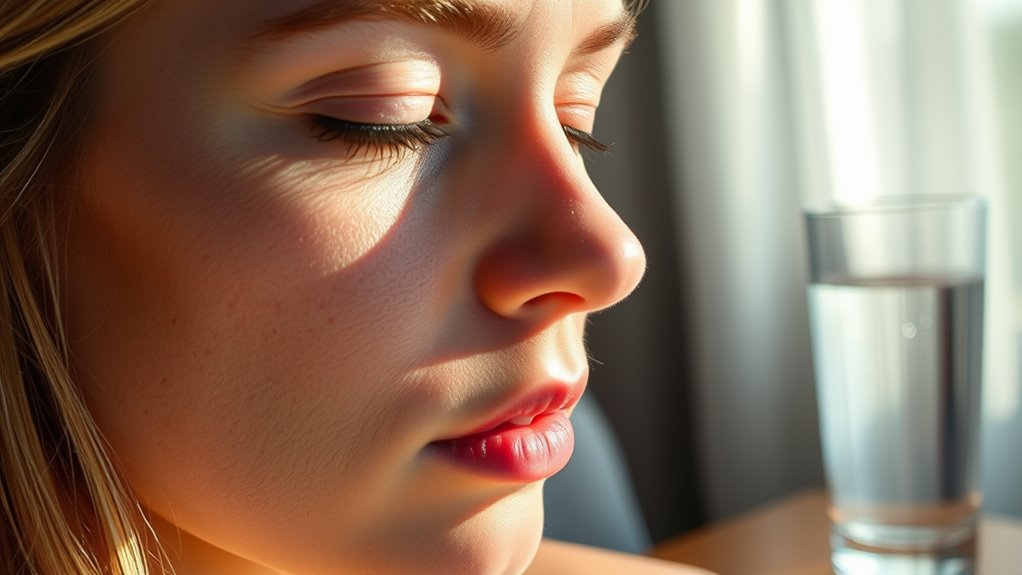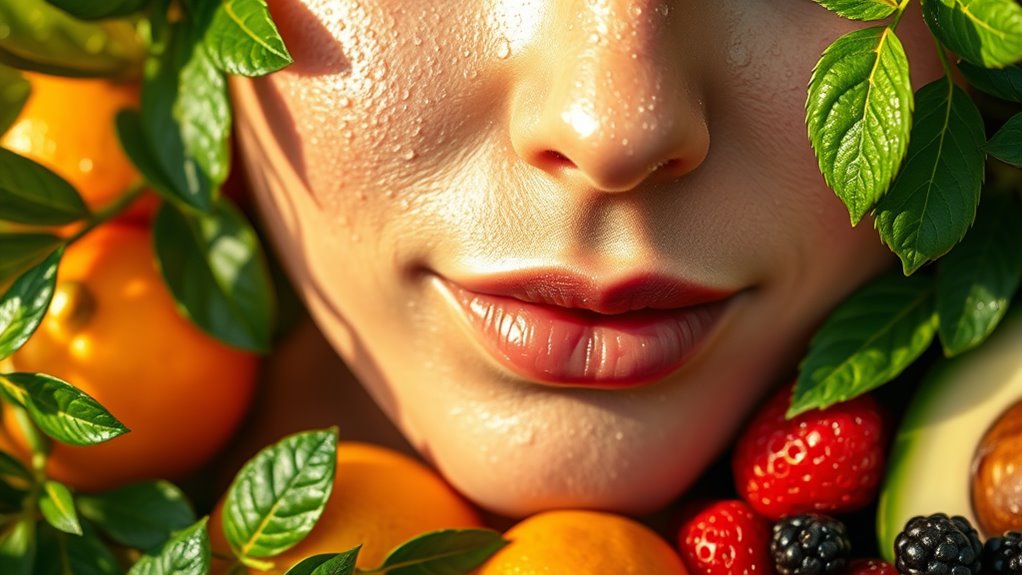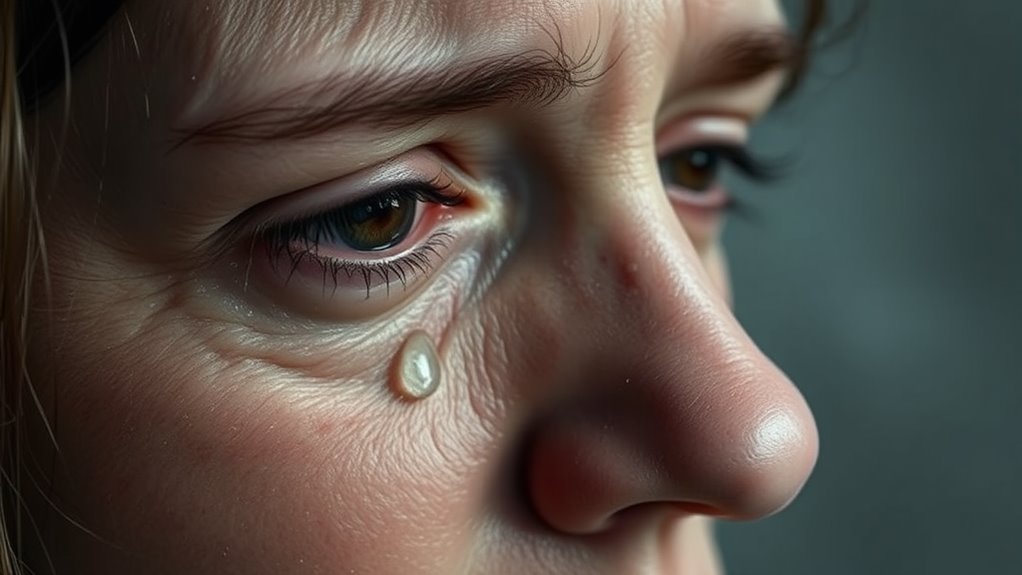The Real Reason You Wake up With Puffy Skin
Waking up with puffy skin is often linked to factors like excess sodium intake, dehydration, and poor sleep quality. When you don’t drink enough water, your body retains fluid, causing puffiness. Additionally, your sleep position can affect fluid distribution, with stomach sleeping being the worst for your face. Finally, certain dietary choices, especially salty or processed foods, can worsen swelling. Understanding these factors can help you address and minimize morning puffiness effectively. More insights await you.
Key Takeaways
- Excess sodium intake and dehydration from alcohol can lead to water retention, causing facial puffiness upon waking.
- Lack of adequate sleep disrupts fluid balance, increasing the likelihood of waking with puffy skin.
- Sleep positions, especially stomach sleeping, can exacerbate fluid accumulation in the face overnight.
- Consuming salty or processed foods promotes inflammation and disrupts fluid balance, contributing to morning puffiness.
- Persistent facial swelling may indicate underlying health issues, requiring medical consultation for proper diagnosis.
Understanding Puffiness: What Causes It?
When you wake up with puffy skin, it’s often due to a combination of factors that can include fluid retention, dietary choices, and even sleep patterns.
One of the primary puffy skin causes is excess sodium intake, which can lead to water retention, particularly overnight. Additionally, alcohol consumption may exacerbate this condition, as it dehydrates the body, prompting it to retain fluid.
Allergies and inflammation can also contribute, as they may cause the skin to swell.
Moreover, lack of adequate sleep can disrupt the body’s natural processes, leading to increased puffiness. To combat morning puffiness naturally, consider hydration levels as they play a crucial role in reducing fluid retention and promoting skin health.
Understanding these underlying puffy skin causes empowers you to make informed choices, reducing the likelihood of waking up with unwanted swelling and promoting overall skin health.
The Role of Hydration in Morning Swelling
Hydration plays a crucial role in managing morning swelling, as it directly affects fluid balance in your body. When you’re adequately hydrated, your cells maintain optimal function, preventing excessive fluid retention.
Conversely, dehydration can lead to an imbalance, prompting your body to retain water as a survival mechanism. This retention often manifests as puffiness, particularly around the face.
Moreover, the quality of hydration matters; electrolytes, especially sodium and potassium, influence fluid distribution. To mitigate morning swelling, aim to consume sufficient water throughout the day, incorporating hydrating foods as well.
Additionally, establishing better sleep habits can further enhance your skin’s appearance by improving overall hydration levels during the night. Monitoring your intake and adjusting based on your activity level and environmental factors can enhance your body’s ability to regulate fluids effectively, reducing the likelihood of waking up with puffy skin.
How Sleep Positions Affect Facial Puffiness
Although you may not realize it, your sleep position can significantly influence facial puffiness by affecting fluid distribution in your body. Certain positions can lead to fluid accumulation in the face, while others may minimize it. Here’s a brief overview of how various positions impact puffiness:
| Sleep Position | Effect on Puffiness |
|---|---|
| Back Sleeping | Minimal puffiness |
| Side Sleeping | Moderate puffiness on lower side |
| Stomach Sleeping | Increased puffiness |
| Elevated Sleeping | Reduced puffiness |
Dietary Influences: Foods That Contribute to Puffiness
Diet plays a crucial role in the degree of puffiness you experience, as certain foods can lead to increased fluid retention in the body. Understanding these dietary influences can empower you to make informed choices that mitigate morning puffiness.
-
Salty Foods: High sodium intake disrupts your body’s fluid balance, resulting in swelling, particularly around delicate facial tissues.
-
Processed Carbohydrates: Foods rich in refined sugars and carbs can cause inflammation, promoting puffiness.
-
Alcohol: Dehydration from alcohol consumption leads to compensatory fluid retention, often manifesting as puffiness. Additionally, certain foods linked to acne breakouts can also exacerbate inflammation and worsen puffiness.
When to Seek Medical Advice for Persistent Puffiness
Puffiness can be a common issue linked to dietary choices, but when it persists despite making healthy adjustments, it may indicate an underlying health concern.
If you notice persistent swelling in your skin, particularly around the eyes or face, it’s essential to consult a healthcare professional. Accompanying symptoms such as pain, redness, or changes in vision warrant immediate attention.
Conditions like allergies, kidney issues, or thyroid dysfunction can manifest as prolonged puffiness. Keep a detailed log of your symptoms and any potential triggers, as this can aid your doctor in diagnosis. Additionally, stress impacts skin health and can exacerbate puffiness, making it crucial to consider your overall well-being.
Don’t ignore persistent puffiness; early intervention can prevent complications and lead to effective treatment tailored to your needs. Prioritize your health by seeking guidance when necessary.




